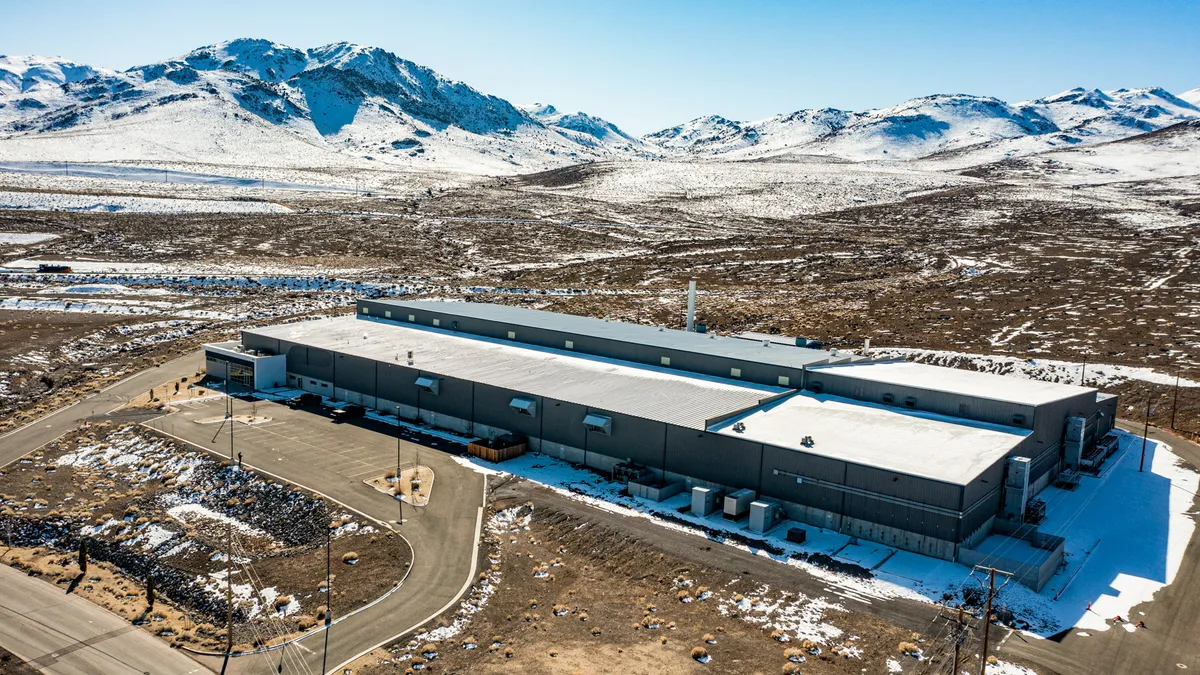Dive Brief:
- American Battery Technology Co. says it has reached a key milestone in its battery recycling process by moving from the commissioning phase to “24/7” operations and doubling its quarterly production of recycled battery materials.
- The battery recycling facility in McCarran, Nevada, first opened in 2023 with grant support from the U.S. Department of Energy. The company says it is now processing “recurring shipments of large-scale batteries” from automotive OEMs and is selling “commercial quantities” of intermediate black mass material, as well as other recycled commodities.
- ABTC also announced it has signed a contract to sell a 12-acre “unused legacy property” in Fernley, Nevada, for about $6.75 million. The sale is meant to bolster future business phases, including a move to produce high-purity battery metals and advance its mining operations.
Dive Insight:
ABTC’s operations progress comes as the large-scale lithium-ion battery recycling industry is facing uncertainty due to factors such as recent tariff news and lack of clarity around the status of federal grant and loan funding for recycling projects.
Under the Biden administration, Inflation Reduction Act and funding from the infrastructure law helped fuel several grant projects under the DOE Loan Programs Office. Funding pauses under the Trump administration have left the status of some of these programs in murky territory.
DOE in September announced that ABTC received a $144 million grant, which the company plans to use for building a second facility, which would be based in South Carolina.
During a Feb. 14 earnings call, CEO Ryan Melsert confirmed that American Battery had the grant contract “in hand” and that plans for the facility were in progress. “We're excited to be moving forward with the design of this second recycling facility, supported by the U.S. Department of Energy,” he said during the call.
ABTC did not immediately respond to a request for comment about the status of the loan or project as of April 7.
Redwood Materials, another battery recycler that received a DOE loan for the construction and expansion of a battery materials campus in McCarran, said it made the decision “to discontinue work on the Department of Energy loan and not move forward with closing” based on “careful consideration of our business priorities and evolving market conditions.” The company recently announced it will collaborate with Isuzu to recycle EV batteries.
Meanwhile, battery recycler Li-Cycle reported a net loss for fiscal year 2024 and said it did not have the capital to draw from a DOE loan worth about $475 million.
DOE support has been a major facet of American Battery’s business plans since before it opened its sole facility in 2023. That included a 2023 grant for $20 million from the agency to further develop battery recycling technologies.
It also received a $2 million battery recycling grant from the U.S. Advanced Battery Consortium, which includes DOE, GM, Ford and Stellantis.
“We still receive significant amounts of grants from our government operations,” Melsert said during the February earnings call, adding that it concluded the funding cycle from a three-year grant a few months ago.
ABTC’s Nevada-based recycling facility is still in its first phase, which involves processing lithium-ion batteries into materials such as copper, aluminum, steel, lithium intermediate and black mass.
The recent production milestones at its recycling facility are a positive step toward the company’s planned second phase of operations, Melsert said in a statement on Friday. The planned second phase is to produce battery-grade nickel sulfate, cobalt sulfate, manganese sulfate and lithium hydroxide. The process is a “feedstock-agnostic system” meant to process various kinds of batteries “regardless of size, shape, or chemistry,” the company said in a release.
“Through hundreds of targeted operational improvements, we’ve significantly enhanced production quality and output, paving the way for the next phase of our recycling technologies,” Melsert said in a statement.
The planned sale of the Fernley site is also meant to help bolster this process, he said. That transaction is expected to close on or before July 10.
American Battery aims to further insulate itself from economic challenges by pursuing a parallel lithium mining business unit at Tonopah Flats in Nevada. This involves using its own technology “to access that lithium,” Melsert said during the earnings call.
The move is meant to meet demand for lithium as the U.S. moves to shore up domestic production for EVs and other battery products, he said.
“While battery recycling is great for keeping materials in the loop once they're already in the field, as the total amount of occupied batteries in the field is growing we also have to fill that loop the first time in addition to closing that loop,” he said.















